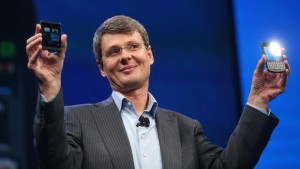Apple’s iPhone is outdated, according to the chief executive of BlackBerry.
Thorsten Heins made the comment on the eve of the much-delayed launch of the new touchscreen BlackBerry in the United States. AT&T begins selling the Z10 touchscreen BlackBerry on Friday, more than six weeks after the company launched the devices elsewhere.
Heins also told The Associated Press that a new keyboard version of the BlackBerry won’t be released in the US until two or three months from now. He previously said it would be eight to 10 weeks, but now he’s saying it could be delayed an additional two weeks.
Both the touchscreen and keyboard models are part of BlackBerry’s attempt at a comeback after the pioneering brand lost its cachet not long after Apple’s 2007 release of the iPhone.
Heins said a lack of innovation at Apple has left iPhone’s user interface outdated. He noted iPhone users have to go in and out of applications and the device doesn’t allow for multitasking like the new BlackBerry Z10 does.
“It’s still the same,” Heins said of the iPhone. “It is a sequential way to work and that’s not what people want today anymore. They want multitasking.”
BlackBerry’s new software allows users to have multiple applications open like on a desktop, he said, noting that with BlackBerry you don’t have to close an application to check an email.
“We’re changing it for the better because we’re allowing people to peak in the hub,” Heins said.
Heins said the iPhone was revolutionary five years ago, but he said it’s now “just kind of sitting there.”
Apple spokeswoman Natalie Kerris declined comment.
But the delay in selling the new keypad BlackBerry, called the Q10, complicates company’s efforts to hang on to customers tempted by the iPhone and a range of devices running Google’s Android operating system. Even as the BlackBerry has fallen behind rivals in recent years, many BlackBerry users have stayed loyal because they prefer a physical keyboard over the touch screen found on the iPhone and most Android devices. But the temptations to switch grow with each additional delay, despite favorable reviews for new system.
Heins said the Q10 keyboard version BlackBerry is just not ready yet and said part of the reason is out of his control.
“It’s our job to deliver the right software package and the right software quality to the carriers,” he said. “Then it is on the carriers to decide how intense they want their testing cycle to be and that really can range from a few weeks to three months.”
US carriers reportedly haven’t made testing a priority because BlackBerry, which is based in Based in Waterloo, Ontario, has dramatically lost market share. The US has been one market in which BlackBerry has been particularly hurting, even as the company is doing well overseas. According to research firm IDC, shipments of BlackBerry phones plummeted from 46 per cent of the US market in 2008 to 2 per cent in 2012.
The iPhone and Android now dominate.
Heins said the company has to regain market share in the US for BlackBerry to be successful.
“You got to win here to win everywhere else,” he said. “That’s just the way it is. We’ve lost market share quite a bit, to put it mildly, and we absolutely need BlackBerry 10 to turn us around.”
Heins said initial sales in other countries are encouraging, but he could not release numbers ahead of BlackBerry’s earnings report.
“I get more and more excited every day,” he said. “I really have to make sure I stay grounded and I don’t lose my sense for reality. But for the whole company this is so important to finally be here, and to see people buying it, after we were told 30 months ago when we started that two quarters down the road we would be bankrupt, we would be out of business.”



